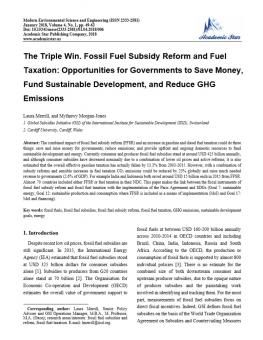
The Triple Win. Fossil Fuel Subsidy Reform and Fuel Taxation: Opportunities for governments to save money, fund sustainable development, and reduce GHG emissions
The combined impact of fossil fuel subsidy reform (FFSR) and an increase in gasoline and diesel fuel taxation could do three things: save and raise money for governments, reduce emissions, and provide upfront and ongoing domestic resources to fund sustainable development and energy.
Currently, global consumer and producer fossil fuel subsidies stand at around USD 425 billion annually, and although consumer subsidies have decreased nominally due to a combination of lower oil prices and active reforms, it is also estimated that the overall effective gasoline taxation has actually fallen by 13.3 per cent from 2003 to 2015. However, with a combination of FFSR and sensible increases in fuel taxation, carbon dioxide emissions could be reduced by 23 per cent globally and raise much-needed revenue to governments (2.6 per cent of GDP). For example, India and Indonesia both saved around USD 15 billion each in 2015 from FFSR. Almost 70 countries included either FFSR or fuel taxation in their Nationally Determined Contributions. This paper makes the link between the fiscal instruments of fossil fuel subsidy reform and fossil fuel taxation with the implementation of the Paris Agreement and SDGs (Goal 7: sustainable energy; Goal 12: sustainable production and consumption where FFSR is included as a means of implementation [MoI]; and Goal 17: MoI and financing).
You might also be interested in
The Cost of Fossil Fuel Reliance
Government support for fossil fuels reached at least USD 1.5 trillion in 2023, new data shows.
Increased Support Needed to Achieve India's Clean Energy Goals
India is on track to achieve many of its 2030 clean energy goals but needs to step up government support measures to accelerate the deployment of offshore wind, electric vehicles, and green hydrogen, according to a new report.
Ending Export Credits for Oil and Gas: How OECD countries can end 2024 with a climate win
For a year now, Organisation of Petroleum Exporting Countries (OECD) governments have been negotiating an agreement that could put an end to oil and gas export finance. Following the acrimony in Baku, this would be a very real way for the OECD to show policy coherence, respond to calls from the poorest countries to stop subsidizing fossil fuels, and shift public finance to solutions.
Fossil Fuel Production, Renewable Energy, and Subsidy Reform in Nationally Determined Contributions 3.0
This policy brief provides an analysis of the critical benchmarks and recommendations necessary for aligning nationally determined contributions (NDCs) with the 1.5 °C target.